Covert advertising by bloggers is an offence
Advertising or opinion? This is the question many users ask themselves when looking through the profiles of bloggers, Instagrammers, YouTubers, tweeters and celebrities. Do they wear that brand of sunglasses, wear that jacket, drive that car, drink that soft drink or use that travel agency because it is their personal choice or is it in fact covert advertising? The United Kingdom and the United States have passed a law prohibiting influencers, people with a strong presence and reputation on social networks, from promoting products without telling the public that they are in fact advertising.
"Covert advertising is a form of misleading advertising, it is illicit and is also prohibited by state law", says Sandra Vilajoana, professor in Information and Communication Sciences at the UOC. The regulations are clear: in the event that there is an agreement from which economic or "in-kind" remuneration is derived between the brand and the influencer, this should be stated on the label using #ad or #promo. The debate regarding the independence of influencers may burst the bubble in which they have been living until now.
Around 85% of Spaniards follow influencers on social media to learn about their experiences and opinions. This type of advertising is an extremely useful and efficient tool for brands, especially when they come across a young audience – most of whom are millennials (39%) aged between 18 and 31 – who do not watch television and, therefore, do not watch traditional advertising either. Through influencers, advertising often infringes "the principle of identification", explains Vilajoana: "The receiver places much more credibility on an objective and unconditioned third-party opinion than on a message from the advertiser". In fact, "the best advertising campaigns are the ones that are not viewed as such, the opinions and assessments of opinion leaders, such as influencers generate more credibility and more receptiveness than advertising", says Elisenda Estanyol, professor at the UOC's Faculty of Information and Communication Sciences. And brands know this.
Thanks to this relationship, brands acquire greater visibility and credibility, "enabling them to communicate a certain lifestyle associated with the brand, certain values that help them to establish a more fluid, empathetic, close and emotional communication with consumers", says Gemma Segura, professor at the UOC's Faculty of Economics and Business. According to a survey, 73% of followers have bought a product based on a recommendation of an influencer.
Selling covertly
The sums paid are exorbitant: Cristiano Ronaldo was paid €260,000 in exchange for posting a tweet for a commercial brand; about €2,000 per character. What is remuneration dependent on? The result of the equation is simple: "The number of the influencer's followers, the frequency of posts and the number of interactions generated by the posts", explains Vilajoana. This advertising information should be identified as such: "Whether there is a financial consideration or remuneration in-kind, the two situations would be included within the concept of remunerative consideration". If there is no indication that it is an advertising message, "an infringement would have been committed", warns the expert; "there is legislation regarding this: the Law on General Advertising, the Law on Unfair Competition and the Law on Information Society Services prohibit covert advertising. From the self-regulation point of view, the Self-Regulation Code of Conduct and the Code of Online Trust also prohibit these practices".
The application of this law against covert advertising will lead to changes for brands, although "it may remove the effectiveness of the message from the point of view of advertising", it is also true to say that these covert practices may also mean discredit to the influencer, "as, if the consumer feels that have been deceived, they may lose trust in them, believing that the influencer's opinions have ceased to be spontaneous and are in line with purely economic interests in a covert way", explains Vilajoana.
Is the game up for influencers?
For Elisenda Estanyol, the answer to this is no, although she believes that the law may have a greater effect on influencers, be they Instagrammers, tweeters or YouTubers. Celebrities are the ones who will be least affected: "The public is more used to the fact that celebrities become ambassadors for various brands and promote a great many products, so it doesn't surprise them". By contrast, "the public creates a more direct relationship with the influencer, a more sincere and two-way dialogue, and they are real opinion leaders when it comes to setting trends". Some 71% of Spaniards who follow influencers read them on social media every day, and, in addition, 29% share their opinions. It will remain to be seen from now on if they start to lose likes and influence.
Experts UOC
Press contact
-
Editorial department
